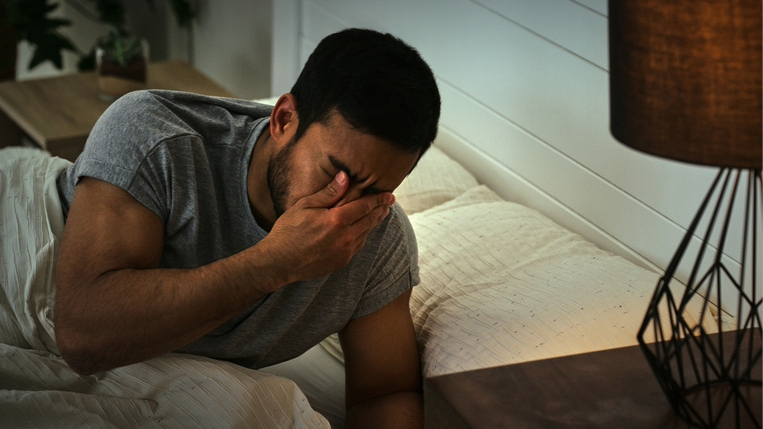Don't worry if you keep waking up at night — expert explains why no-one really ‘sleeps through’
Staying asleep all night isn’t what we should be striving for

Staying asleep all night is often touted as the hallmark of a quality night’s rest. Yet for many of us, waking frequently throughout the night is perfectly normal. Sleep experts have even given it a name — Wakefulness After Sleep Onset (WASO).
“Waking up at nighttime is a normal part of sleep physiology,” explains Dr. Sujay Kansagra, a double-board certified pediatric neurologist and doctor of sleep medicine at Duke University Medical Centre. “We should all expect to have some amount of wakefulness at nighttime.”
However, with sleep tracking devices becoming increasingly sophisticated, the frequency of our night time awakenings can feel concerning. Here, we’ll explore why you might be waking up at night, when waking up at night becomes a problem, plus why no one really ‘sleeps through’ anyway.
Does anyone really stay asleep all night?
Many of us put pressure on ourselves to stay asleep all night, but is that realistic? No, says Dr Kansagra. “This is because we go through sleep cycles while we sleep,” he explains, noting that an adult sleep cycle usually lasts around 90 minutes.
“During this time we dip into deep sleep and then back into light sleep again. It isn't unusual to have an awakening after a full sleep cycle, particularly in the second half of the night.” Some sleep experts believe our ancestors considered waking up a normal part of the nightly routine.
How many times is it considered normal to wake up at night?

Rather than focusing on how often you're waking at night, consider instead how rested you feel overall. "There is no discrete number for normal versus abnormal awakenings at night," says Dr Kansagra. "Instead I recommend focusing on the overall pattern of awakenings and how you feel the next day."
If several awakenings during the night are separated by a decent chunk of sleep, you're able to fall back asleep easily after a nighttime awakening, and you feel well rested the next day, the chances are this is normal for you, explains Dr Kansagra.
When is waking up at night considered a problem?
Waking up at night is common and happens so frequently that we often don't remember it happening. However, if you suddenly find yourself waking more frequently and struggling to fall back to sleep, it could be a sign of an underlying problem.
"If the pattern has suddenly shifted and you are having many more awakenings than you did previously, this could be a sign of an underlying problem such as sleep apnea," explains Dr Kansagra. "Night awakenings are also a problem if they lead to excessive amount of frustration with difficulty getting back to sleep or daytime consequences due to lack of quality and quantity of sleep."
4 common causes of waking up at night
Whether it's external factors such as room temperature and mattress comfort, or even occasional bathroom breaks, waking up at night is normal. Here are five common causes of waking up at night.
1. Poor sleep environment
Your sleep environment plays a significant role in your ability to stay asleep all night. From the temperature of your bedroom to the comfort of your mattress, to anything else that might disturb your slumber.
A healthy sleep environment includes a clutter-free bedroom, ensuring your bedroom is the optimal temperature for sleep, and that ambient noise and lights are blocked out. If you are thinking of investing in a new mattress for a better night's sleep, our guide to the best mattresses for all sleep styles and budgets is a great place to start.

2. Normal bodily needs
Whether it's a visit to the bathroom, a quick change of sleep position, or you're simply transitioning from one sleep stage to another, waking up at night is often a normal bodily response. However, if these night time awakenings are followed by a period of being unable to fall back to sleep, that's when it can indicate a problem.
3. Poor sleep hygiene
Your sleep hygiene is a catch-all term to describe your sleep environment and the habits that surround your rest. Examples of poor sleep hygiene include an inconsistent sleep schedule, eating too close to bedtime and scrolling on your phone late into the night — all of which can impact your ability to both fall and stay asleep.
As well as cleaning up your sleep environment (see above), improving your sleep hygiene habits can help you stay asleep all night. Start by establishing a nighttime routine, avoiding stimulants and cutting out scrolling in the lead up to bed time.
4. Underlying sleep disorders
Occasionally, waking up at night is the result of an underlying sleep disorder, such as insomnia or sleep apnea. If the amount you’re waking up at night has suddenly increased or you’re no longer able to easily fall back to sleep, it could be a symptom. If your night time awakenings persist and you feel tired and lethargic during the day as a result of sleep deprivation, we recommend seeking advice from your healthcare provider.

Nicola is the Sleep Editor at Tom’s Guide, where she helps steer the mattress and sleep content published on Tom’s Guide, including our Best Mattress for Back Pain buying guide. With a career in journalism spanning the best part of two decades, Nicola brings experience to the team and the knowledge of what makes a great article, whether that’s a how-to mattress cleaning feature, a deep dive into melatonin gummies, or an in-depth mattress review. As a sleep editor, few better understand how important a decent mattress is to the overall quality of our sleep, and precisely how our sleep impacts our physical and mental health. As well as tackling the vast topic of sleep, Nicola joins the raft of expert mattress specialists at Tom’s Guide, who test and compare a wide range of mattresses in order to guide readers towards the very best options on the market.
